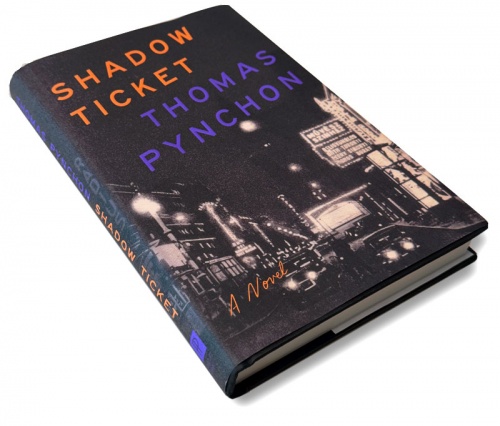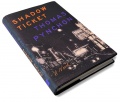Difference between revisions of "Main Page"
| (8 intermediate revisions by the same user not shown) | |||
| Line 6: | Line 6: | ||
*[https://www.ebay.com/sch/i.html?_nkw=Thomas+Pynchon+Shadow+Ticket&_sacat=0&_from=R40&_trksid=p2334524.m570.l1313&_odkw=Thomas+Pynchon+Inherent+Vice&_osacat=0 '''Search EBay''' for ''Shadow Ticket''] | *[https://www.ebay.com/sch/i.html?_nkw=Thomas+Pynchon+Shadow+Ticket&_sacat=0&_from=R40&_trksid=p2334524.m570.l1313&_odkw=Thomas+Pynchon+Inherent+Vice&_osacat=0 '''Search EBay''' for ''Shadow Ticket''] | ||
*Check out some [[#Featured Articles|'''Featured Articles''']] | *Check out some [[#Featured Articles|'''Featured Articles''']] | ||
| − | *[[Songs_mentioned_in_Shadow_Ticket|'''Musicians and works of music''' mentioned in ''Shadow Ticket'']] | + | *[[Songs_mentioned_in_Shadow_Ticket|'''Musicians and works of music''' mentioned in ''Shadow Ticket'']] |
| + | *''Shadow Ticket'' is getting '''GREAT''' reviews. Check them out [[Shadow Ticket Reviews|here]]. | ||
| + | |||
<!-- *Penguin Press's [[Bleeding_Edge_trailer|'''trailer''']] for ''Bleeding Edge'' --> | <!-- *Penguin Press's [[Bleeding_Edge_trailer|'''trailer''']] for ''Bleeding Edge'' --> | ||
| − | This is the Wiki for [[Thomas Pynchon]]'s ''Shadow Ticket''. Besides using the [[ | + | This is the Wiki for [[Thomas Pynchon]]'s ''Shadow Ticket''. Besides using the [[ST_Alpha_Nav|'''Alphabetical Index''']] and the [[Shadow_Ticket_-_Page_by_Page|'''page-by-page annotation''']], you can also take a look at [[Shadow Ticket cover analysis|''Shadow Ticket'' cover analyses]], read the [[Shadow Ticket Reviews|reviews]], or [[Shadow Ticket Title|entertain some theories on the source of the title]]. |
| − | Check out the [[Songs]] in ''Shadow Ticket'' Playlist. | + | <!-- Check out the [[Songs]] in ''Shadow Ticket'' Playlist.--> |
<div style="clear:both;"></div> | <div style="clear:both;"></div> | ||
| Line 22: | Line 24: | ||
{{ST_Alpha_Nav}} | {{ST_Alpha_Nav}} | ||
| + | |||
| + | <p> </p> | ||
==Page by Page Annotations== | ==Page by Page Annotations== | ||
| Line 27: | Line 31: | ||
==Featured Articles== | ==Featured Articles== | ||
| − | [[File: | + | [[File:NYT-Essential-Pynchon.jpg|thumb|left|200px|Illustration: ''New York Times'']]'''This overview of Pynchon's ''oeuvre'' by A.O. Scott for ''The New York Review of Books'' is quite good...'''<br />"But hear me out: Those plots encompass crime capers, costume dramas, spy thrillers and combat epics. Pynchon’s pages teem with spies, gumshoes, femmes fatales and popeyed sailor men. If his books don’t exactly follow genre formulas, they nonetheless reliably dispense genre gratification. His dizzying inventions are built on a sturdy, sometimes half-invisible scaffolding of popular fiction.<br /> |
| − | + | ||
| − | + | ||
| − | + | ||
| − | + | ||
| − | + | ||
| − | + | ||
| − | + | ||
| − | + | ||
| − | + | ||
| − | + | ||
| − | + | ||
| − | + | ||
| − | + | There’s more to it than that, of course. Graduate students revere him for a reason. But let’s roll with the conceit and proceed, in Pynchonesque fashion, to feed his defiantly anti-algorithmic work through a handmade mock algorithm. If you want an anarchist Dan Brown, a horny Robert Ludlum, a countercultural David Baldacci, Pynchon might be your man. Maybe that’s a stretch, and maybe (definitely) none of these books will stay in these conceptual boxes. But here are eight purposely whimsical recommendation prompts, gateways to a fictional universe that finally defies all categorization." [https://www.nytimes.com/article/thomas-pynchon-books.html Full article »] | |
| − | + | ||
| − | |||
<p style="clear:both"></p> | <p style="clear:both"></p> | ||
Latest revision as of 13:55, 7 October 2025
Welcome to the Shadow Ticket Wiki!If you wish to contact us or suggest edits, use this Contact page.
- Purchase Shadow Ticket:
Paperback Hardcover - Search EBay for Shadow Ticket
- Check out some Featured Articles
- Musicians and works of music mentioned in Shadow Ticket
- Shadow Ticket is getting GREAT reviews. Check them out here.
This is the Wiki for Thomas Pynchon's Shadow Ticket. Besides using the Alphabetical Index and the page-by-page annotation, you can also take a look at Shadow Ticket cover analyses, read the reviews, or entertain some theories on the source of the title.
Contents
How to Use this Wiki
There are two major ways to use this wiki. The first is the Shadow Ticket Alphabetical Index, used to keep track of the myriad characters, real and imagined, as well as events, arcana, and lots of other stuff. The second is the Spoiler-Free Annotations by Page, which allows the reader to look up and contribute allusions and references while reading the book, in a convenient and spoiler-free manner.
Apart from those, it's up to you.
Shadow Ticket Alpha Guide to Characters, Places & More
Page by Page Annotations
| Chapter 1 pp. 1-11 |
Chapter 2 pp. 12-15 |
Chapter 3 pp. 16-27 |
Chapter 4 pp. 28-38 |
Chapter 5 pp. 39-42 |
| Chapter 6 pp. 43-45 |
Chapter 7 pp. 46-50 |
Chapter 8 pp. 51-57 |
Chapter 9 pp. 58-61 |
Chapter 10 pp. 62-69 |
| Chapter 11 pp. 70-75 |
Chapter 12 pp. 76-81 |
Chapter 13 pp. 82-91 |
Chapter 14 pp. 92-101 |
Chapter 15 pp. 102-114 |
| Chapter 16 pp. 115-122 |
Chapter 17 pp. 123-125 |
Chapter 18 pp. 126-131 |
Chapter 19 pp. 132-141 |
Chapter 20 pp. 142-153 |
| Chapter 21 pp. 154-160 |
Chapter 22 pp. 161-172 |
Chapter 23 pp. 173-178 |
Chapter 24 pp. 179-187 |
Chapter 25 pp. 188-195 |
| Chapter 26 pp. 196-206 |
Chapter 27 pp. 207-209 |
Chapter 28 pp. 210-227 |
Chapter 29 pp. 228-232 |
Chapter 30 pp. 233-238 |
| Chapter 31 pp. 239-243 |
Chapter 32 pp. 244-250 |
Chapter 33 pp. 251-256 |
Chapter 34 pp. 257-263 |
Chapter 35 pp. 264-269 |
| Chapter 36 pp. 270-277 |
Chapter 37 pp. 278-284 |
Chapter 38 pp. 285-289 |
Chapter 39 pp. 290-293 |
Featured Articles
This overview of Pynchon's oeuvre by A.O. Scott for The New York Review of Books is quite good..."But hear me out: Those plots encompass crime capers, costume dramas, spy thrillers and combat epics. Pynchon’s pages teem with spies, gumshoes, femmes fatales and popeyed sailor men. If his books don’t exactly follow genre formulas, they nonetheless reliably dispense genre gratification. His dizzying inventions are built on a sturdy, sometimes half-invisible scaffolding of popular fiction.
There’s more to it than that, of course. Graduate students revere him for a reason. But let’s roll with the conceit and proceed, in Pynchonesque fashion, to feed his defiantly anti-algorithmic work through a handmade mock algorithm. If you want an anarchist Dan Brown, a horny Robert Ludlum, a countercultural David Baldacci, Pynchon might be your man. Maybe that’s a stretch, and maybe (definitely) none of these books will stay in these conceptual boxes. But here are eight purposely whimsical recommendation prompts, gateways to a fictional universe that finally defies all categorization." Full article »
Pynchon Wiki Help and Contributor Guidelines
Click here for help with editing and creating pages.
We have a few conventions we ask that you follow:
- When creating a new page, first check to make sure a page/article about what you want to write about hasn't already been created, by checking the list of all Wiki pages on this Bleeding Edge Wiki. If a page already exists, please modify that one.
- When creating a new page, if its information pertains to one (and only one) specific Pynchon novel, please categorize it with the appropriate identifier. For example, a page pertaining to Bleeding Edge, should use the syntax
[[Category:BE]].
- To open a discussion on an individual listing of the Alpha Index, create one using the entry on Peter Tait as an example. Basically, give it a name that identifies the alpha listing (eg [[Name Discussion|DISCUSSION]]) and notice that the visible name will be "DISCUSSION" in full caps, so it stands out a bit.
External Links
- Latest news on Thomas Pynchon (Google News)
- ThomasPynchon.com
- hashslingrz.com
- Shipwreck Library (was The Modern Word) Pynchon page
- Pynchonoid Blog
- Wikipedia Bleeding Edge page
- Literarywiki.org - wiki annotations to works by Pynchon, Umberto Eco, and many others.
Image Gallery
Below are some of the images you will find on Pynchon Wiki.Plus-fours.jpg
WikiAdmin
15:09, 6 October 2025
98 KB
Toby-Wing.jpg
WikiAdmin
10:15, 6 October 2025
253 KB
NYT-Essential-Pynchon.jpg
WikiAdmin
13:10, 5 October 2025
92 KB
Nagymezö-Street-1930.jpg
WikiAdmin
10:23, 2 October 2025
91 KB
Blondell.jpg
WikiAdmin
10:17, 1 October 2025
66 KB
Shadow-Ticket US-Cover...
WikiAdmin
13:38, 26 September 2025
88 KB
Thanks, and enjoy...








